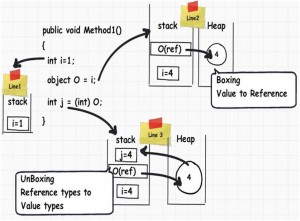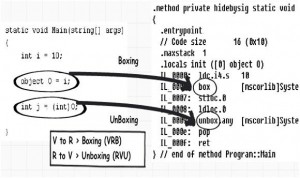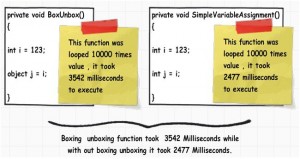 When we move a value type to reference type the data is moved from the stack to the heap. When we move reference type to a value type the data is moved from the heap to the stack.
When we move a value type to reference type the data is moved from the stack to the heap. When we move reference type to a value type the data is moved from the heap to the stack.
This movement of data from the heap to stack and vice-versa creates a performance hit.
When the data moves from value types to reference types its termed as ‘Boxing’ and the vice versa is termed as ‘UnBoxing’.
If you compile the above code and see the same in ILDASM you can see in the IL code how ‘boxing’ and ‘unboxing’ looks, below figure demonstrates the same.

Performance implication of Boxing and unboxing
In order to see how the performance is impacted we ran the below two functions 10,000 times. One function has boxing and the other function is simple. We used a stop watch object to monitor the time taken.
The boxing function was executed in 3542 MS while without boxing the code was executed in 2477 MS. In other words try to avoid boxing and unboxing. In project you always need boxing and unboxing , use it when it’s absolutely necessary.

